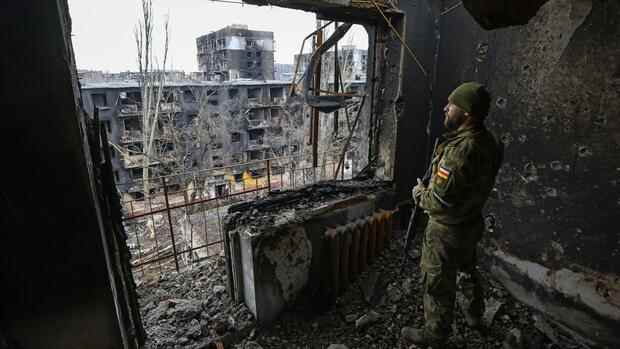No truce for Orthodox Easter.
(Photo: action press)
Berlin With airstrikes against the port city of Odessa at the weekend, the Russian army underpinned its previously announced new war goal: According to the announcement by the Russian Major General Rustam Minnekayev, after the Donbass in eastern Ukraine, a land bridge along the Black Sea coast to Transnistria should also be conquered. This would cut off Ukraine from any access to the sea. Minnekayev, commander of the central Russian military district, justified the plan by saying that the Russian-speaking population in the breakaway Transnistrian sub-area of the Republic of Moldova was being oppressed.
In Odessa, the largest city in southern Ukraine and only 40 kilometers from the Dniester Republic occupied by Russian troops, Russian rockets hit residential buildings on Saturday. Eight people were killed, including a three-month-old baby, and 18 were injured, some seriously.
“The territory in which Russia should protect the rights of Russian-speaking people is Russia itself,” said Ukrainian President Volodymyr Zelensky in a video message early Sunday morning about Russia’s war goals, which have now been publicly expressed for the first time. Russia is a country without freedom of expression and free elections, “a country where poverty is thriving and human life is worth nothing,” emphasized Zelenskiy in Kyiv, where he gave a press conference in a central metro station on Saturday evening. During Russian shelling, thousands flee to underground subway stations.
The government of the Republic of Moldova, which, like Ukraine, is striving for EU membership, also responded to Moscow’s threat. The foreign ministry in the capital, Chisinau, summoned the Russian ambassador there to express “deep concern” at the statements made by Moscow’s senior military commander. The accusation that the Russian-speaking population is being oppressed in Moldova is unfounded, the Foreign Ministry said on its website. Moldova’s neutrality “must be respected by all international actors, including the Russian Federation”.
Top jobs of the day
Find the best jobs now and
be notified by email.
In 1990, one year before the collapse of the Soviet Union, the Dniester Republic split from the former Soviet Republic of Moldova, which had become independent, in a five-month war. A ceasefire was agreed in 1992, and Russia has since deployed more than 1,000 soldiers, who are declared “peacekeepers,” who had previously supported the separatists. Russia has not yet recognized the 450,000-inhabitant region in the east of the mostly Romanian-speaking Moldova as a state.
Western secret services are now assuming that Russian President Vladimir Putin wants to implement his “Novorossiya” (New Russia) project – a Russia expanded to include the east and south of Ukraine as well as Transnistria and the two territories South Ossetia and Abkhazia split off from Georgia. Influential Russian nationalist and neo-fascist circles around the oligarch Konstantin Malofeev have been campaigning for this “Novorossiya” in Moscow for years.
US ministers expected in Kyiv
In order to move forward with this project, an “independence” referendum is to be held on Wednesday in the Black Sea port city of Cherson, which has been occupied since the beginning of March. Similar to the detachment of the eastern Ukrainian regions of Luhansk and Donetsk in 2014/15, coordinated by the Russian army and secret services, Cherson, located 100 kilometers north-west of the Crimean peninsula annexed by Russia in 2014, is also to proclaim itself an independent people’s republic. This was the result of findings by Ukrainian secret services, citing Ukrainian city officials who had been deposed by the Russian occupying forces in Cherson. But the EU ambassador in Kyiv, the Estonian diplomat Matti Maasikas, also warned of this.
Zelensky again called for a face-to-face meeting with Putin to seek a diplomatic solution to end the war. In the event of a referendum orchestrated by Moscow or the murder of the Ukrainian soldiers and civilians still holed up in the encircled port of Mariupol, there would be “no more negotiations”.
Both ministers will discuss arms deliveries with the Ukrainian government in Kyiv on Sunday evening.
(Photo: Reuters)
Also in Mariupol and other cities in the Donbass, the Russian army continued to attack on the Orthodox Easter, which is celebrated in both countries. Kremlin boss Putin had not responded to Zelenski’s request for an Easter ceasefire. According to information from both sides, localities there were shot at on Sunday morning. While Russia claimed to have attacked military positions, videos of residents showed apartment buildings destroyed. According to the findings of the British secret service, the Russian army has not made any significant land gains.
In the evening, Selenski was expecting US Ministers Antony Blinken (outside) and Lloyd Austin (defense) to visit Kyiv. It should be about further deliveries of heavy weapons from the USA in order to be able to recapture areas occupied by Russia. Austin has already invited defense ministers and high-ranking military officials from allied states to a “Ukraine Security Consultative Group” at the US air force base in Ramstein, Palatinate, for Tuesday. Military aid for Ukraine is to be coordinated more closely there.
More: Dispute over arms deliveries in the Bundestag
